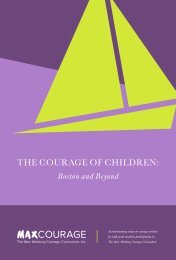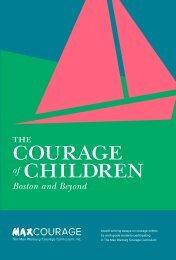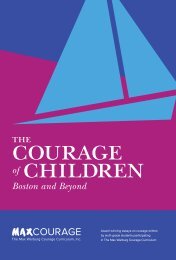The Courage of Children: Boston and Beyond XXXI
Award-winning essays on courage written by sixth-eight grade students participating in The Max Warburg Courage Curriculum.
Award-winning essays on courage written by sixth-eight grade students participating in The Max Warburg Courage Curriculum.
Create successful ePaper yourself
Turn your PDF publications into a flip-book with our unique Google optimized e-Paper software.
Olive Harron<br />
Michael Andrews, Teacher<br />
Barnstable Intermediate School, Barnstable, MA<br />
Have you ever hurt yourself by accident <strong>and</strong> known you could not do anything<br />
to prevent it? This kind <strong>of</strong> event I’ve dealt with every day since I was three<br />
years old.<br />
I have been different all my life. I was born with a neurological disorder called<br />
Tourette Syndrome. This causes my brain to send the wrong signals down<br />
my spine causing uncontrollable movements or noises called tics. It’s kind<br />
<strong>of</strong> like someone is taking over your body. I show courage by living with<br />
Tourette Syndrome. To me, courage means persevering through the hard<br />
moments in life.<br />
My tics were not noticeable until I was three years old. My mom noticed I was<br />
scrunching up my face, but she thought I was squinting. She brought me to<br />
the eye doctor <strong>and</strong> the pediatrician to see if I needed glasses; both doctors<br />
told us it was normal. <strong>The</strong>y said I would grow out <strong>of</strong> it as I get older.<br />
A few years later, when I was about six, I started to get vocal tics. Vocal tics<br />
are when you make noises. We ignored it <strong>and</strong> thought it would go away,<br />
until second grade. I had an onset <strong>of</strong> tics <strong>and</strong> my mom thought I was<br />
having seizures. My mom searched for a neurologist <strong>and</strong> we found one in<br />
<strong>Boston</strong>. My neurologist said, “Right now it is an explosion <strong>of</strong> tics. This is a<br />
tic disorder.” If I didn’t overcome it by a year <strong>and</strong> a half, they would likely<br />
diagnose me with Tourette Syndrome. While it gets better as I get older, the<br />
doctors shared that it never really goes away.<br />
<strong>The</strong> summer before I went into third grade I finally was diagnosed with a tic<br />
disorder; it got in the way <strong>of</strong> everything, like sports, cooking, hanging out with<br />
friends, <strong>and</strong> a lot more. My tics became aggressive from third grade to fifth<br />
grade, <strong>and</strong> all <strong>of</strong> the painful tic attacks that I have gone through almost broke<br />
me down. I went through a phase where I was very sad all <strong>of</strong> the time, <strong>and</strong><br />
I did stupid things to myself to help the pain go away because <strong>of</strong> how many<br />
people at my school bullied me.<br />
“I hope as I get older,<br />
I can help other<br />
kids who’ve grown<br />
up like me to show<br />
<strong>and</strong> see their own<br />
courage <strong>and</strong> worth.”<br />
myself bruises because <strong>of</strong> the severity, but now most <strong>of</strong> my tics are in my arms,<br />
h<strong>and</strong>s <strong>and</strong> face; it’s mostly just flexing my arms every couple minutes or<br />
making a fist.<br />
Not many people have Tourette Syndrome, but we all have things in life to<br />
overcome. Don’t be afraid to ask for help. If you don’t want to talk to anybody<br />
about it because you are embarrassed, I promise you can talk to your parents<br />
or a trusted adult. <strong>The</strong>y can help by getting you the therapies <strong>and</strong> support you<br />
need. Something that I tried was Comprehensive Behavioral Intervention for<br />
Tics (CBIT). It’s supposed to help your brain redirect your tics <strong>and</strong> to send the<br />
correct signals down your spine. It didn’t help me but it might help someone<br />
else. Everybody who has tics or Tourette Syndrome is different, so you have to<br />
do what you think is best for your body.<br />
My definition <strong>of</strong> courage is to never give up, no matter what obstacles life puts<br />
in your way. I know that courage will help me as I get older because I have<br />
gotten through a lot in my life, so I can get through a lot more. No matter<br />
how weak you feel, keep pushing. It gets worse before it gets better–trust me,<br />
I know. I hope as I get older, I can help other kids who’ve grown up like me to<br />
show <strong>and</strong> see their own courage <strong>and</strong> worth.<br />
After my tics got very bad for about a year, I got diagnosed with Tourette<br />
Syndrome in fourth grade. I started medication in fifth grade which helped a<br />
lot, <strong>and</strong> I learned how to suppress the physical manifestations <strong>of</strong> my Tourette.<br />
I conquered most symptoms <strong>of</strong> the disorder. I still tic a lot <strong>and</strong> I still have<br />
tic attacks, but a lot less than I used to. More importantly, my tics now aren’t<br />
nearly as painful as they used to be. I used to hit myself by accident <strong>and</strong> give<br />
<strong>The</strong> <strong>Courage</strong> <strong>of</strong> <strong>Children</strong>: <strong>Boston</strong> <strong>and</strong> <strong>Beyond</strong><br />
Volume <strong>XXXI</strong><br />
78 79









